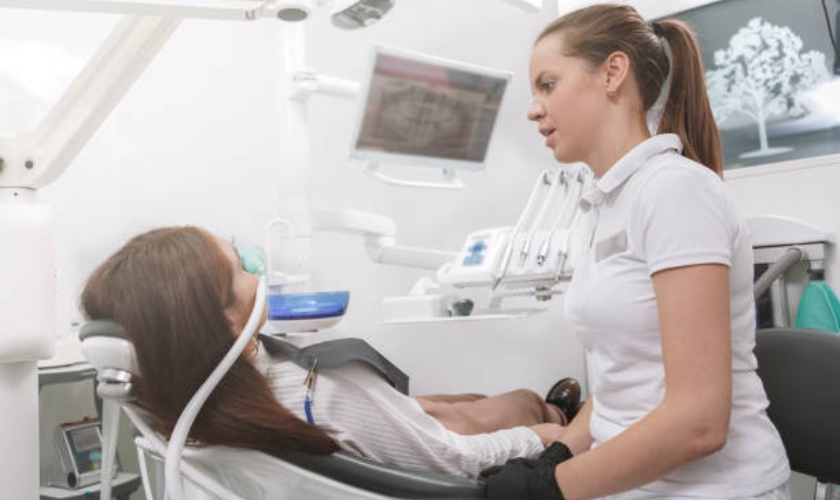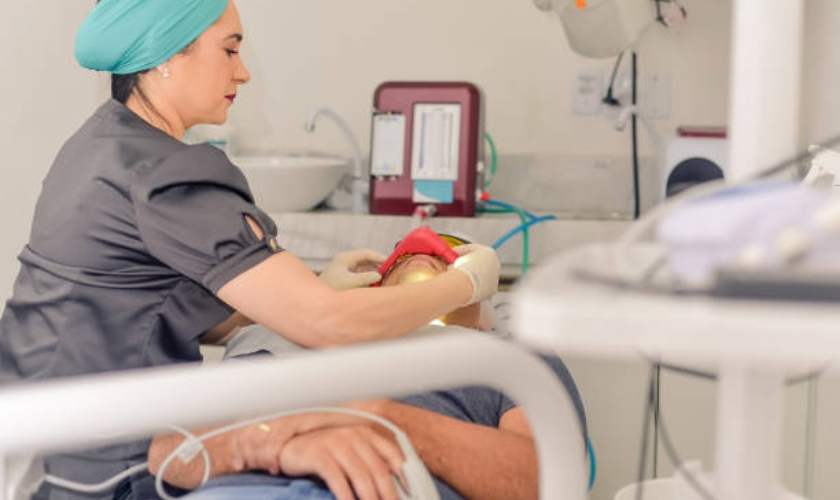
Dental anxiety is a prevalent problem that many people experience. For some, just the thought of visiting the dentist can trigger overwhelming fear. This anxiety may cause one to put off getting critical dental care, which may result in more severe issues later on.
Fortunately, oral sedation can provide a solution for those struggling with severe anxiety during dental treatment. This method helps patients feel more relaxed and comfortable during their dental appointments. Let’s explore how oral sedation can make a significant difference for those dealing with dental anxiety.
What Is Oral Sedation?
Taking a prescription medicine is necessary for oral sedation before your dental appointment. This medication helps you feel calm and relaxed throughout the procedure. It’s different from other forms of sedation, such as nitrous oxide (laughing gas) or intravenous sedation, which are administered during the visit.
Here’s how oral sedation typically works:
- Pre-Appointment: You’ll take the medication at home, usually about an hour before your appointment.
- During the Appointment: The medication will help you stay calm and reduce anxiety.
- Post-Appointment: You might feel a bit groggy after the procedure, but you’ll generally recover quickly.
The best kind of sedative for patients who experience moderate to severe anxiety about dental procedures.
What are the Benefits of Oral Sedation?
Oral sedation provides numerous advantages, particularly for those with severe dental anxiety:
- Enhanced Relaxation: Promotes a sense of calm and reduces stress, making dental visits more comfortable.
- Improved Comfort: Eases the discomfort during longer or more complex procedures, allowing you to remain at ease.
- Reduced Awareness: Minimizes your awareness of the procedure, which can be particularly beneficial if you feel anxious about dental treatments.
- Ease of Use: The medication is taken orally before your appointment, which is straightforward and less invasive compared to other sedation methods.
These benefits can significantly enhance your dental experience and make necessary treatments more manageable.
How Does Oral Sedation Address Severe Dental Anxiety?
Severe dental anxiety can lead to avoidance of dental care. In such scenarios, sedation helps ease the fear and stress associated with dental visits. This can make the experience less intimidating and more manageable.
- Facilitates Necessary Procedures: With reduced anxiety, patients are more likely to follow through with essential dental treatments. This helps prevent minor issues from becoming major problems.
- Improves Cooperation: When patients are more relaxed, they tend to be more cooperative during the procedure, which can help the dentist in Newton, KS, work more efficiently.
- Promotes Regular Visits: By making dental appointments more comfortable, oral sedation encourages regular visits. This helps maintain overall oral health and avoid emergencies.
These benefits contribute to a more positive dental experience and encourage better oral health practices.
Is Oral Sedation Right for You?
Not everyone is a candidate for oral sedation. Several factors can influence whether this option is suitable:
- Medical History: Your medical history will be examined by Dr. Bo Davidson to make sure there are no contraindications with the medication used for sedation.
- Current Medications: It’s important to inform your Newton dentist about any medications you’re currently taking, as there could be interactions.
- Severity of Anxiety: Oral sedation is generally recommended for those with moderate to severe anxiety. For milder cases, other methods might be more appropriate.
Your dentist, Dr. Bo Davidson, will perform a comprehensive examination to ascertain if oral sedation is the best choice for you.
Preparing for Oral Sedation
To guarantee a seamless encounter, preparation is essential with oral sedation. Here are some steps to follow:
- Follow Instructions: Your dentist, Dr. Bo Davidson, will provide specific instructions on when and how to take the medication. Be sure to follow these closely.
- Arrange Transportation: Since the sedation medication can make you groggy, arrange for someone to drive you to and from your appointment.
- Discuss Concerns: If you have any questions or concerns about the procedure, discuss them with your dentist beforehand.
Proper preparation can help make your appointment more comfortable and stress-free.
What to Expect After Oral Sedation?
After the procedure, there are a few things to keep in mind:
- Recovery Time: You may feel drowsy or disoriented for a short period. This is normal and should wear off as the medication leaves your system.
- Post-Appointment Care: Follow any post-care instructions provided by your dentist to ensure a smooth recovery.
- Follow-Up: If you have any concerns or experience unusual symptoms after the procedure, contact your dentist for guidance.
These actions will facilitate a speedy recovery and address any concerns you may have.
Embracing a Calmer Dental Experience with Oral Sedation
Oral sedation is a valuable tool for overcoming severe oral anxiety. By providing a way to stay relaxed and comfortable during dental procedures, it helps improve the overall dental experience. If you struggle with anxiety during dental treatment, discuss oral sedation with your dentist, Dr. Bo Davidson, to determine if it’s the right option for you. With the right approach, you can achieve a stress-free dental visit and maintain better oral health.
For those looking for comprehensive solutions, oral sedation services in Newton and surrounding areas can offer the support needed to manage anxiety effectively. Don’t let fear stand in the way of your dental health—consider oral sedation as a step towards a more comfortable and manageable dental experience.
Frequently Asked Questions
Your dentist, Dr. Bo Davidson, will provide specific instructions regarding eating and drinking before taking the medication. Typically, it is advised to avoid eating or drinking a few hours before your appointment to prevent nausea or other adverse effects.
The effects of oral sedation can vary depending on the medication used and the dosage. Generally, the sedative effects last for a few hours. It’s important to arrange for someone to drive you home after your appointment, as you may feel drowsy for some time.
While oral sedation is generally safe, there can be side effects such as drowsiness, dizziness, or a dry mouth. In rare cases, patients might experience nausea or an allergic reaction. Your dentist, Dr. Bo Davidson, will discuss potential risks and ensure that oral sedation is suitable for you based on your medical history.



